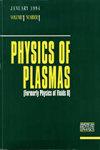在 LMJ 观测到的类似马沙克波的特征
IF 2.2
3区 物理与天体物理
Q3 PHYSICS, FLUIDS & PLASMAS
引用次数: 0
摘要
我们详细介绍了在激光梅加焦耳(LMJ)设备上进行的两项实验的结果,这两项实验旨在研究在封闭于金属管中的低密度二氧化硅气凝胶中传播的类似超音速马沙克波。这里所说的相似是指,这两次实验由相同的输入辐射温度历史驱动,但特意使用了在长度(L = 1200 或 2000 μm)、直径(2R = 1000 或 2000 μm)、管壁性质(金或铜)和气凝胶密度(ρ = 30 或 20 mg/cm3)方面截然不同的管子,但两次实验的传播时间和管子出口处的锋面辐射温度是相同的。据我们所知,这是第一次同时使用一维软 X 射线成像仪和宽带 X 射线光谱仪对出口处的马沙克波进行表征,前者用于测量辐射锋的过境时间和曲率,后者用于推断其温度历史。这些约束结果成功地与简单分析模型[Cohen 等人,Phys. Rev. Res. 2, 023007 (2020)和 Hurricane 等人,Phys. Plasmas 13, 113303 (2006)]以及三维拉格朗日辐射流体力学代码 TROLL 的结果进行了比较,从而获得了 X 射线能量损失的信息。管子的长度、直径和性质(控制这些损耗)之间的可控补偿效应,使得这两个类似射流沿管子的辐射温降最终相同。本文章由计算机程序翻译,如有差异,请以英文原文为准。
Characterization of similar Marshak waves observed at the LMJ
We detail results of two experiments performed at the Laser Mégajoule (LMJ) facility aimed at studying similar supersonic Marshak waves propagating in a low-density SiO2 aerogel enclosed in metallic tubes. Similar means here that these two experiments, driven by the same input radiation temperature history, use purposely very different tubes in terms of length (L = 1200 or 2000 μm), diameter (2R = 1000 or 2000 μm), nature of the wall (gold or copper), and aerogel densities (ρ = 30 or 20 mg/cm3), yet the transit time and the radiation temperature of the fronts at the tube exit are the same for both shots. Marshak waves are characterized at the exit using simultaneously for the first time to our knowledge, a one dimensional soft x-ray imager from which the radiation front transit time and curvature are measured and also a broadband x-ray spectrometer to infer its temperature history. These constraining results are then successfully compared to those from simple analytical models [Cohen et al., Phys. Rev. Res. 2, 023007 (2020) and Hurricane et al., Phys. Plasmas 13, 113303 (2006)] and from the three dimensional Lagrangian radiation-hydrodynamics code TROLL to get information on x-ray energy losses. Controlled compensation effects between the length, diameter, and nature of the tubes (governing these losses) are such that the radiation temperature drop along the tubes is eventually the same for these two similar shots.
求助全文
通过发布文献求助,成功后即可免费获取论文全文。
去求助
来源期刊

Physics of Plasmas
物理-物理:流体与等离子体
CiteScore
4.10
自引率
22.70%
发文量
653
审稿时长
2.5 months
期刊介绍:
Physics of Plasmas (PoP), published by AIP Publishing in cooperation with the APS Division of Plasma Physics, is committed to the publication of original research in all areas of experimental and theoretical plasma physics. PoP publishes comprehensive and in-depth review manuscripts covering important areas of study and Special Topics highlighting new and cutting-edge developments in plasma physics. Every year a special issue publishes the invited and review papers from the most recent meeting of the APS Division of Plasma Physics. PoP covers a broad range of important research in this dynamic field, including:
-Basic plasma phenomena, waves, instabilities
-Nonlinear phenomena, turbulence, transport
-Magnetically confined plasmas, heating, confinement
-Inertially confined plasmas, high-energy density plasma science, warm dense matter
-Ionospheric, solar-system, and astrophysical plasmas
-Lasers, particle beams, accelerators, radiation generation
-Radiation emission, absorption, and transport
-Low-temperature plasmas, plasma applications, plasma sources, sheaths
-Dusty plasmas
 求助内容:
求助内容: 应助结果提醒方式:
应助结果提醒方式:


